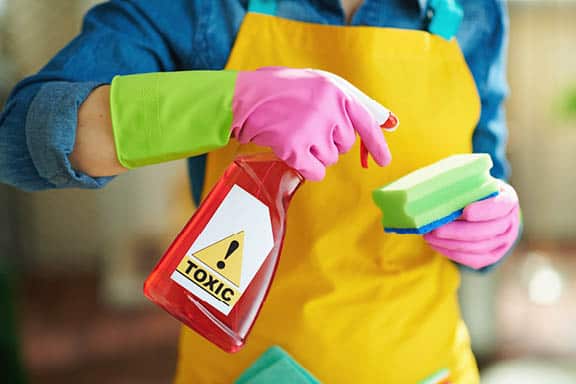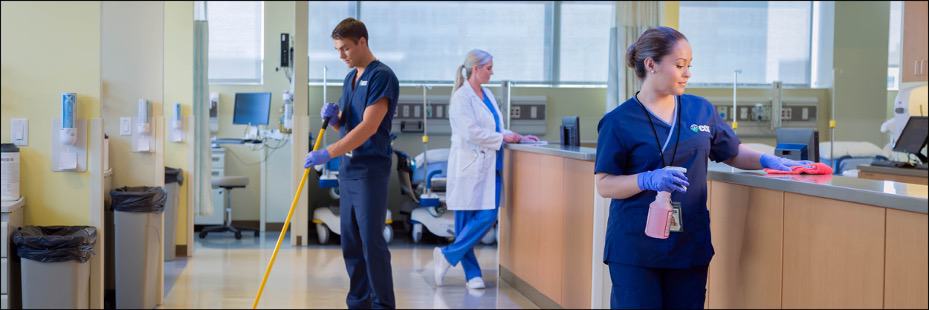Healthcare facilities’ environmental services teams, commonly known as EVS, are a group of healthcare workers responsible for maintaining a clean and safe environment for patients, providers, visitors, and staff. This includes tasks such as cleaning patient rooms, disinfecting common areas, and ensuring proper hand hygiene products are well-stocked to decrease infection risk.
The COVID-19 pandemic brought the importance of hospital environmental services into sharp focus. In the context of the pandemic, the role of EVS teams is more critical than ever in preventing the spread of respiratory illnesses and ensuring the safety of those who enter hospitals.
Beyond COVID-19, other respiratory illnesses such as influenza, RSV, and others have become a significant concern for healthcare providers and the general public. These diseases can spread quickly and easily and can have severe consequences for those infected.
EVS teams use a variety of equipment and supplies to perform cleaning and disinfection tasks, including hospital-grade cleaning solutions and disinfectants, personal protective equipment (PPE) such as gloves and masks, and specialized equipment such as high-efficiency particulate air (HEPA) filters. They also use industrial cleaning equipment consisting of microfiber mops and brooms and hospital-grade vacuum cleaners. Ensuring equipment and supplies are readily available and in good working order is critical to the success of an EVS team to deliver a healthy environment of care.
The tasks and responsibilities of EVS teams in healthcare facilities include:
- Cleaning and disinfecting patient rooms, common areas, and equipment
- Monitoring and reporting potential outbreaks or confirmed outbreaks
- Stocking hygiene products to help maintain compliance with infection prevention protocols
- In conjunction with infection prevention and clinical teams, providing education and training to staff on infection control measures
- Working in concert with facility infection prevention, implementing isolation protocols for patients with infectious diseases
- Ensuring that equipment and supplies are properly stored and restocked as needed
It is essential for EVS teams to follow best practices and implement effective infection control protocols in order to maintain a clean and safe environment in healthcare facilities. This is especially important in the fight against respiratory illnesses. These teams also face a number of challenges in their work, including limited resources, high patient turnover, heavy workloads, and difficulty in recruiting and retaining staff.
To overcome these and additional challenges, the following best practices can help EVS teams perform as efficiently as possible in fighting against respiratory illnesses:
- Regularly review and update infection control protocols
- Prioritize high-touch areas and high-risk patient rooms for cleaning and disinfection
- Develop clear protocols for handling and disposing of contaminated materials
- Work with infection prevention team to provide staff with regular training and education on infection control measures
- Establish effective communication channels with other departments in the hospital
- Implement measures to reduce the spread of germs, such as promoting hand hygiene and respiratory etiquette
- Use appropriate personal protective equipment and cleaning supplies
- Reinforce that cleaning and disinfection protocols are followed consistently and effectively
Another critical aspect of EVS’ role in the context of cleaning against respiratory illnesses is the management of waste. Hospital waste is categorized as either regulated medical waste or general waste, and each type must be disposed of differently. Regulated medical waste includes items contaminated with infectious diseases and must be handled with extra care to prevent the spread of viruses. EVS staff must be trained to correctly identify, manage, and dispose of different types of waste to ensure the safety of both patients and staff.
In addition to the traditional responsibilities of EVS, these teams also may be called upon to help manage the logistics of testing and vaccinations, which was heavily demonstrated during the early months of COVID-19. This could involve preparing areas for these operations, managing the flow of patients, and ensuring that appropriate PPE is available and utilized.
Lastly, EVS staff must be provided with ongoing training and support to make sure they have the skills and knowledge to manage the challenges posed by respiratory illnesses effectively. This may include training on the use of new disinfectants, PPE and waste management practices, and ongoing updates on best practices and guidelines from public health authorities.
Coming out of the ongoing pandemic and with the continued focus on the dangers of respiratory illnesses, EVS teams have been recognized as unsung heroes in cleaning for health, and their work should be recognized and valued. They play a vital role in keeping healthcare providers, patients, staff, and visitors safe and healthy. It is essential that they have the resources they need to do their jobs. By working together and following best practices, environmental services teams can help to prevent the spread of respiratory illnesses and protect vulnerable patients and staff. Learn more about how CCS Facility Services can support healthcare facility EVS departments and functions
Scented Hazards to Health and Indoor Air Quality

According to research from the National Institute of Environmental Health Science (NIH), fragrances in cleaning products have been associated with respiratory issues, skin irritation and rashes, and more severe reactions in small children like vomiting and bowel disruption. This is due in part to the Volatile Organic Compounds (VOCs) contained in artificial fragrances.
Aside from observable health effects on directly exposed individuals, VOCs can negatively impact indoor air quality (IAQ) within a facility, according to the EPA. CCS Facility Services discusses impacts that IAQ can have on facilities and building occupants in our post Maintaining Indoor Air Quality as Workforces Return to the Office. Additionally, some traditional chemical cleaning products have been found to contain carcinogens (substances capable of causing cancer). The University of Washington performed a study observing how harmful chemicals can spread through air vents from the use of certain laundry products. Recurrent use of these harmful substances can cause discomfort, illness, and in extreme cases even hospitalization if not understood fully and properly used in facility cleaning practices.
Smelling the Unknown
A major contributor to the danger of fragrant cleaning products is not knowing what the fragrance is made of. Artificial fragrances have been considered “trade secrets” in the industry for decades, with minimal outside oversight on research and implementation. Thousands of chemicals fall under the term “fragrance” and are not required to be individually listed on labels in the United States. The fragrance industry in the United States self-regulates under the name of the International Fragrance Association (IFRA) and provides safety standards to fragrance manufacturers on banned or restricted chemicals – but it is entirely voluntary with no official intervention by any third-party agency. With no checks and balances on the chemical makeup of these fragrances, facility management cannot fully guarantee a healthy environment for janitorial staff or building occupants directly exposed to these products.
The Green Solution
Switching to an eco-friendly alternative for cleaning products delivers a host of benefits for both the environment and facility occupants. Green products have been found to be exceptional replacements – or enhancements – to any facility’s supply closet. While green products may not deliver a scent of “Lavender Fields,” product ingredients are transparent. The EPA manages a certification program called Safer Choice, where products are labeled to signify whether they carry ingredients that are safer for individual and environmental health. In addition, partnering with the right commercial cleaning provider can be an effective step in switching to healthier cleaning practices and ensuring the safest products are used. Commercial cleaners such as CCS Facility Services can earn accreditation from organizations such as the U.S. Green Building Council that aim to provide solutions and resources for sustainable cleaning.
CCS Facility Services is proud to be a leader in sustainability in the commercial cleaning space, and, in fact, being green isn’t just in our business practices, it’s in our logo! To learn more about CCS’ commitment to an excellent, environmentally healthy clean, visit our Sustainability page.

